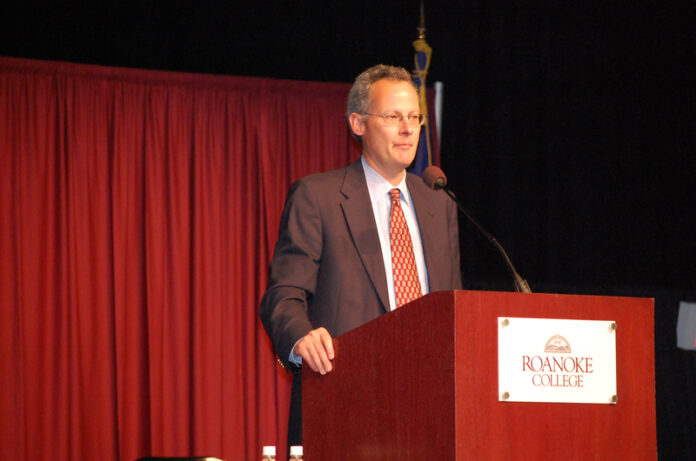
Acclaimed business writer and speaker, Nicholas Carr, spoke at Roanoke College last week to a sizable crowd that braved heavy rains to make their way to the Bast Center. Carr, whose often controversial theories relative to technology, business and culture have drawn both scorn and praise presented his lecture, “The Shallows: Mind, Memory and Media in an Age of Instant Information,” as part of the Henry H. Fowler Lecture Series.
Carr’s main premise, which he continually wrapped in layers of supporting evidence, is that once literate humans are losing their ability to concentrate on longer, more substantive sources of information – that by virtue of having access to an endless stream of short bits of information via the internet, “we are now in the middle of a cultural / information revolution no less important and ground shaking as when Guttenberg invented his printing press.”
Carr warned that it is not so much the content of what we watch on television or pursue on the internet but how we take that information – the process by which we go about it – that has the potential to adversely affect us the most as both individuals and as a culture.
He made a compelling case for this statement over the next 90 minutes citing both concrete studies from leading medical journals to his own oft-revealing personal experience. At one point he reached into his pocket and withdrew a mobile internet device and said, “It’s now with us everywhere we go. If you don’t think it’s changing how we think and how our minds go about processing information – think again.”
Some of Carr’s more influential books include, “The Big Switch: Rewiring the World, from Edison to Google” (2008), and “Does IT Matter? Information Technology and the Corrosion of Competitive Advantage” (2004). His celebrated 2003 Harvard Business Review article “IT Doesn’t Matter” sparked a worldwide debate on the role of computers, as did his recent Atlantic article, “Is Google Making Us Stupid?”
As is the norm for the Fowler Lecture Series, Carr concluded his presentation by taking questions submitted from the audience through a panel of Roanoke College Professors. Carr seemed genuinely impressed by his audience’s grasp of the issues surrounding his theories on memory and new media’s effect upon it. The crowd left with plenty to “process” – if not perhaps in a different way than they may have when they entered the room.
Carr’s next book, “The Shallows: What the Internet Is Doing to Our Brains,” from which much of this lecture was taken is available through his website: www.nicholasgcarr.com.
By Stuart Revercomb [email protected]
